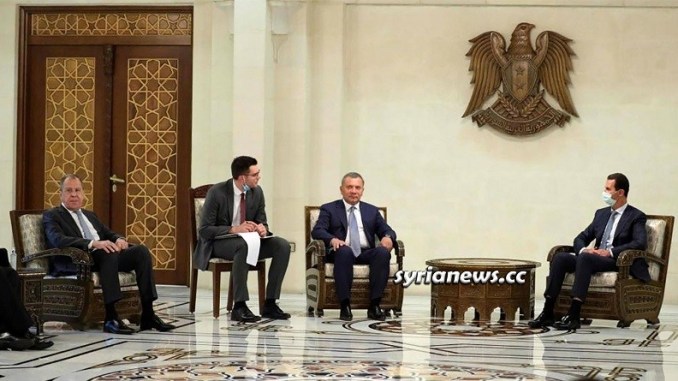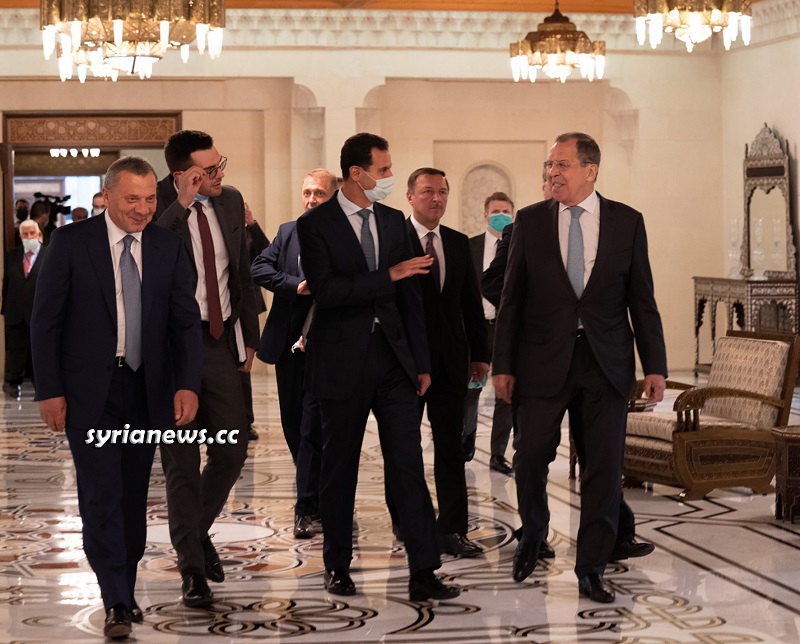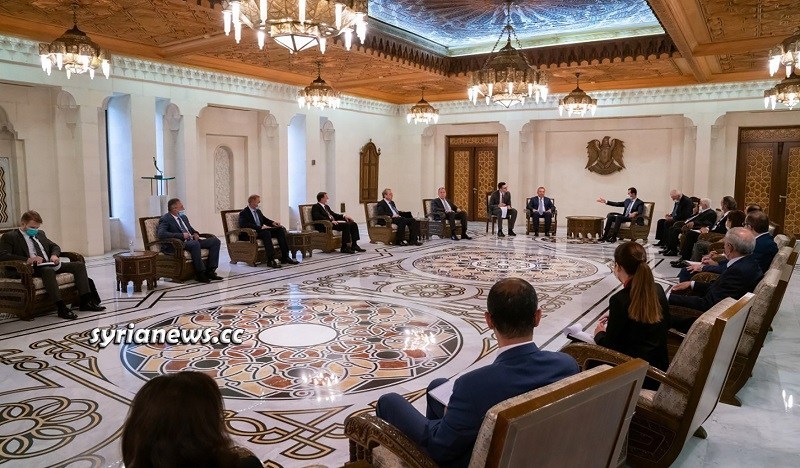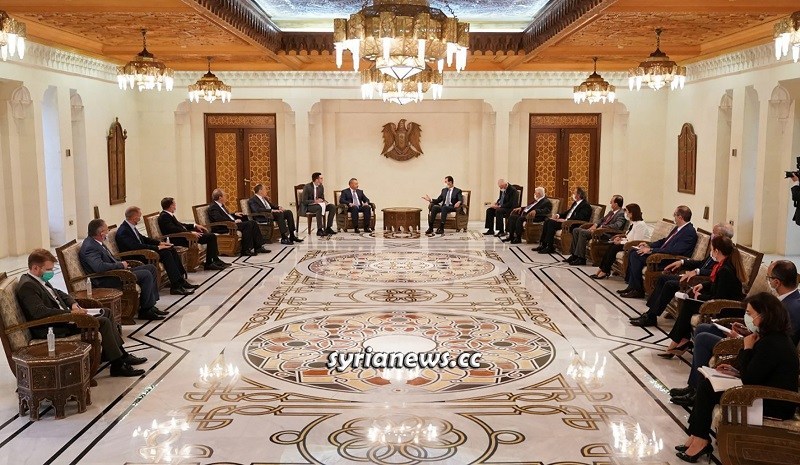
Russian Deputy Prime Minister for Economic Affairs led a high-level delegation to the Syrian capital Damascus to affirm Moscow’s position towards its oldest continuous and reliable friend, and at times a close ally, in the face of an unprecedented dirty war of terror and attrition waged against it by the world’s superpowers and super-rich countries.
The delegation included the Russian foreign minister Sergey Lavrov and a host of business representatives, the visit included a meeting with President Bashar Assad and resulted in a number agreements covering the rebuilding of Syria’s infrastructure and emphasizing on Syria’s sovereignty, territorial unity and integrity.
In addition to facing the NATO-sponsored merciless terrorists, US proxy separatist militias, and the blockade, the COVID 19 measures added further burden to the Syrian economy, with sporadic forest fires in one of its remaining fertile regions not infested by the terrorists or occupation forces.
The following is a compiled report by the Lebanese Al Mayadeen news station covers the important outcomes of the visit and side of the press conference held by the Russian Deputy Prime Minister, and the Syrian and Russian foreign ministers Walid al-Muallem and Sergey Lavrov:
https://videopress.com/embed/VzcBrQzD?preloadContent=metadata&hd=1The video is also available on BitChute.
Transcript of the English translation:
The work on the Syrian track depends on what was reached between the Russian, Iranian and Turkish presidents, with the support and approval of the Syrian leadership, and that what unites the three countries’ views is seeking to prevent the Iraqi and Libyan scenario despite the differences in viewpoints.
With regard to the issue of Syria’s sovereignty, territorial unity, and integrity, all the charters and documents issued through the Astana track, like all the Russian-Turkish bilateral agreements, literally stipulate the two countries ’commitment to the sovereignty, unity, and territorial integrity of Syria, noting that the territories under the control of the Syrian government have expanded significantly after signing the additional Russian-Turkish memorandum.
Of course, there are significant differences in the positions of Moscow, Ankara, and Tehran on how to conduct the Syrian settlement, and we can see them in the statements of the representatives of these countries, but what unites Russia, Iran, and Turkey is the steadfast pursuit of preventing a recurrence of the Iraq or Libya scenario. Our joint action within the framework of the Astana process depends on the imperative of respecting the sovereignty, independence, unity, and territorial integrity of Syria, the importance of preventing any external interference in its internal affairs, and the importance of preventing any external incitement to the separatist atmosphere.
Syrian Foreign Minister Walid al-Muallem said that the debate on the Syrian constitution will continue until an agreement is reached, indicating that what will come out of the constitutional committee will be submitted to a popular referendum.
Foreign Minister Walid al-Muallem: With regard to the next constitution, this is up to what the members of the Constitutional Committee reach from both sides, if they want to amend the existing constitution or produce a new constitution, in both cases the product will be submitted to a popular referendum in order to ensure that it represents the widest popular representation.
There is no timetable for (preparing) the constitution. This constitution occupies special importance and a popular sanctity that cannot be completed in a hurry under pressure. This must be accomplished in a way that achieves the aspirations of the Syrian people. The debate on it will continue until they reach an understanding among themselves, and it has nothing to do with the presidential elections.
Russian Deputy Prime Minister for Economic Affairs, Yuri Borisov, said: Most of the areas rich in natural resources are outside the control of the Syrian government, which constitutes an obstacle to the Syrian trade, given that it is an important source of revenue.
Russian Deputy Prime Minister for Economic Affairs Yuri Borisov: Unfortunately, we have to admit that most areas rich in oil and gas are currently outside the control of the Syrian government, bearing in mind that the gas and oil trade were an important source of revenue for the Syrian budget and the same is related to fertile agricultural areas, and this fact harms food security Syria is also forced to import oil and grains after it was exporting them. The draft of the new agreement on expanding commercial, industrial, and economic cooperation between Russia and Syria includes more than 40 new projects, including reconstruction projects for energy institutions and infrastructure for the energy sector, in addition to the reconstruction of a number of hydroelectric power stations that were built by the Union (USSR) or with the participation of Soviet experts, in addition, a work contract has been signed for a Russian company on the Syrian coast to extract oil at sea, and this contract is awaiting its ratification.
The tragic situation in Syria and these obstacles are caused by the destructive position of the American administration, in addition to the unwillingness of the Kurds to communicate with Damascus and hand over control to the legitimate government in Damascus over the agricultural areas and oil and gas fields.
Russian Foreign Minister Sergey Lavrov is in Damascus for the first time in eight years, accompanied by a large delegation, to strengthen relations between Moscow and Damascus.
Economically, Moscow seemed to continue to strengthen economic cooperation through agreements to be signed between Russia and Syria. Politically, regarding the Syrian presidential elections, Lavrov was clear by saying: The elections are the sovereign decision of the Syrian Arab Republic. While it was confirmed by Minister Al-Moallem that the Syrian presidential elections are taking place on schedule next year.
Minister Lavrov’s statements did not deviate from the expectations and readings prior to his arrival in Damascus. The Russian minister folded the eight years from the time of his first visit and the Syrian war with three titles as a way out that Damascus needs to get out of the complexities of the crisis, in the work of the Constitutional Committee, economic cooperation, and the completion of the war on terror.
It was not arbitrary that the Russian Deputy Prime Minister, Yuri Borisov, sat on one platform with the Russian and Syrian Foreign Minister Lavrov and Al-Muallem. Giving the economic dimension a place in the visit to Damascus was one of its most important goals in the agreements to rebuild the infrastructure in the energy and economy sector and expand Russian investments to alleviate the consequences of Caesar’s sanctions.
The few hours in the presidential palace also carried many messages, and the presidential statement went beyond just pre-registering the points of agreement between the two parties, but turned into a message about a partnership to be held in the war on economic sanctions and overcoming the blockade.



The meeting confirmed the continuation of the political process through the Astana track, which set a horizon and an exit point for the war in the hands of Moscow, Tehran, and Damascus, and continues to neutralize the Western powers that seek to divide Syria, and in the work of the Constitutional Committee in Geneva without a timetable for rewriting or amending the constitution, and there is no political solution except from inside Syria. According to UN Resolution 2254, in conjunction with the elimination of the remaining hotbeds of terrorism, to prevent a recurrence of the Libya and Iraq scenario in Syria.
Moscow sends to Damascus a high-level political and economic delegation to re-establish the general lines of its strategy in support of the Syrian state, and Moscow realizes that its position in the Syrian file is an essential part of its rise again in the world, but it is also mainly in ensuring fundamental issues that confirm the unity of soil and the Syrian map.
Dima Nassif – Damascus, Al-Mayadeen
End of the report by Al Mayadeen
When the whole world’s economies struggle from the consequences of COVID 19 and the strict measures implemented to contain it, the western hypocrite and criminal officials doubled-down their sanctions on the Syrian people, who are still fighting ISIS which the west itself claim is the worst terrorist organization, claiming they are helping them by killing them slowly, Trump imposed his Caesar Act regime of sanctions, not applied to any other country on the planet, and the European Union renewed their draconian sanctions for a further year.
The Pentagon Threatening to Revive ISIS
Jaafari Demands UN Halt Terrorists without Borders, Looters of Syria
Hearing is Not Like Seeing: NATO’s Terrorists Burning Syrian Wheat Crops – Video
To help us continue please visit the Donate page to donate or learn how you can help us with no cost on you.
Follow us on Telegram: http://t.me/syupdates link will open Telegram app.
Filed under: American Aggression, Iran, NATO, Russia, Syria, Syria Assad, Takfiris, Turkey, War on Syria | Tagged: Al Mayadeen, Astana, Caesar’s law on Syria, Lavrov, Syria Reconstruction, Syrian election, Syrian sovereignty, Walid al-Moallem |
Related posts:
Views: 0
 RSS Feed
RSS Feed

















 September 11th, 2020
September 11th, 2020  Awake Goy
Awake Goy  Posted in
Posted in  Tags:
Tags: 
















